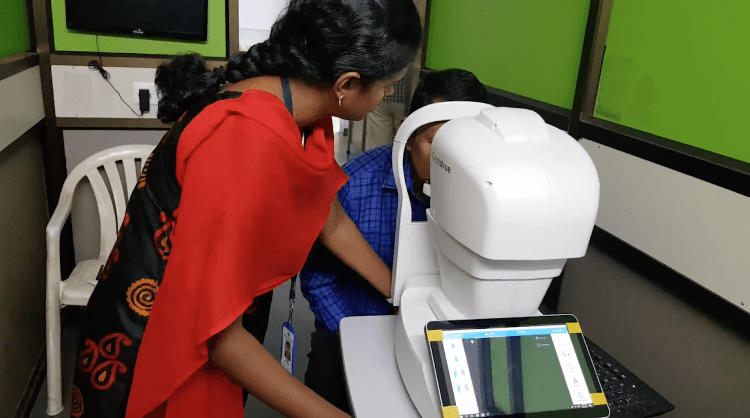testsetset
For the better part of four years, Alphabet life sciences company Verily and Google’s AI research division have been developing an artificially intelligent (AI) system that can diagnose diabetic retinopathy (DR), a disease that can cause permanent eye damage if left untreated. (It’s the fastest-growing cause of blindness among the more than 415 million diabetic patients worldwide, according to the National Eye Institute.) Today, in an extension of their work, Google revealed that it has deployed the algorithm for real-world clinical use at Aravind Eye Hospital in Madurai, India.
Google detailed its partnership with Aravind in 2017, at Wired’s Business Conference and the annual TensorFlow Developer Summit. The hospital’s been working on an automated diabetic retinopathy screening since 2003, but according to Dr. R. Kim, chief medical officer and chief of retina services, Google’s AI-driven approach far surpassed early efforts in terms of both speed and accuracy.
Thanks to the algorithm — which recently received a CE mark, indicating it meets the European Union Directive’s standards for medical devices — Kim said physicians at Aravind’s vision centers will have “more time to work closely with patients on treatment and management of their disease” while “increasing the volume of screenings [they] can perform.”
Developing the AI-driven DR screening approach involved curating a dataset of 128,000 ophthalmologist-evaluated images of the interiors of eyeballs, according to Google, which were used to train a deep neural network — layers of mathematical functions modeled after biological neurons — to detect DR. Its performance was tested on two separate clinical validation sets totaling around 12,000 images, and the results showed that, compared with a panel of human ophthalmologists, it met or exceeded baseline performance. (It has a 97.5 percent accuracy rate.)
June 5th: The AI Audit in NYC
Join us next week in NYC to engage with top executive leaders, delving into strategies for auditing AI models to ensure fairness, optimal performance, and ethical compliance across diverse organizations. Secure your attendance for this exclusive invite-only event.
Google last year said that it’s been conducting similar research in Thailand, and at the AI for Social Good Summit in Bangkok announced a partnership with the Rajavithi Hospital to pilot its DR-screening algorithm.
The Mountain View company has invested broadly in AI health care applications. Last spring, its Medical Brain team claimed to have created an AI system that could predict the likelihood of hospital readmission and to have used it to forecast mortality rates at two hospitals with 90 percent accuracy. In February 2018, scientists from Google and Verily created a neural network that could accurately deduce basic information about a person, including their age and blood pressure, and whether they were at risk of suffering a major cardiac event like a heart attack. And more recently, Google said it had developed AI that could detect metastatic breast cancer with 99 percent accuracy.
DeepMind, Google’s London-based AI research division, is involved in several health-related AI projects, including an ongoing trial at the U.S. Department of Veterans Affairs that seeks to predict when patients’ conditions will deteriorate during a hospital stay. Previously, it partnered with the U.K.”s National Health Service to develop an algorithm that could search for early signs of blindness. And in a paper presented at the Medical Image Computing & Computer Assisted Intervention conference earlier this year, DeepMind researchers said they’d developed an AI system capable of segmenting CT scans with “near-human performance.”


